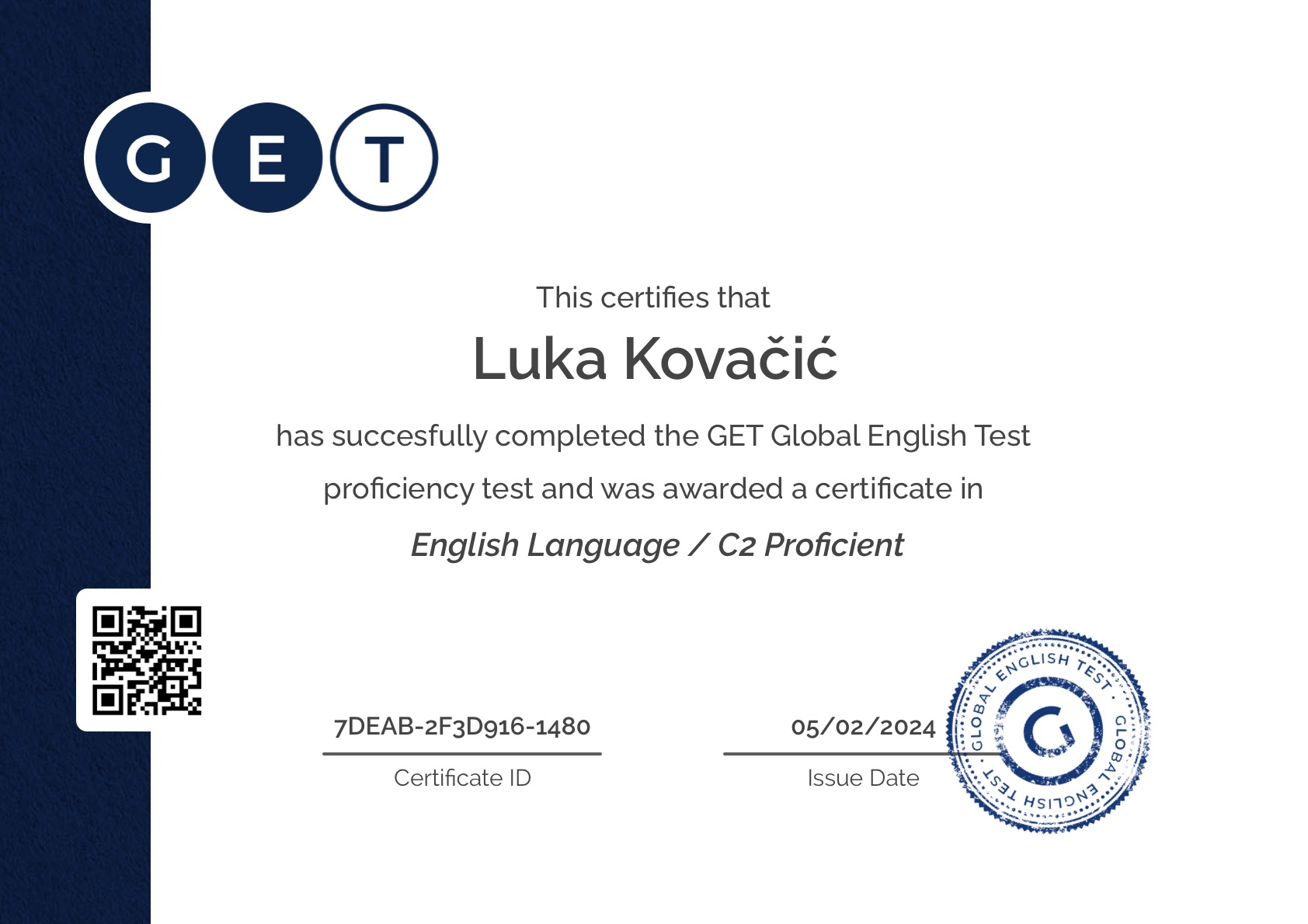
C2 English Level (Proficient)
The C2 English level, commonly referred to as “Proficient,” represents the highest level of language proficiency in English. Individuals at the C2 level have near-native competence and can communicate effectively in almost any situation. Here are some key characteristics of the C2 English level:
-
Can understand and interpret virtually any written material
-
Able to participate effectively in debates, discussions, and negotiations
-
Can write with a high degree of grammatical accuracy and stylistic sophistication
What is C2 English Level (Proficient)?
The C2 English proficiency level, according to the Common European Framework of Reference for Languages (CEFR), is the highest level of mastery in the language. At this level, individuals are considered proficient or near-native speakers of English. Here’s what C2 proficiency entails across various language skills:

A C2 English Level Certificate. Start the test to get yours now!
Listen to a C2 English Level Speaker
Play the audio recording below to listen to an example of a conversation by someone speaking English at a C2 level.

Key characteristics of the C2 English level (Proficient):
Native-like Fluency
Individuals at the C2 level can speak English fluently, confidently, and accurately, with a native-like accent and pronunciation. They can express themselves with ease and spontaneity in a wide range of contexts, including formal presentations, debates, and casual conversations.
Advanced Vocabulary and Grammar
They have an extensive vocabulary and a deep understanding of grammar, allowing them to communicate with precision and sophistication. They can use a wide range of vocabulary and grammatical structures accurately and appropriately in their speech and writing.
Excellent Listening Comprehension
They can understand spoken English in a variety of contexts, including fast-paced conversations, lectures, interviews, and media broadcasts. They can grasp complex ideas, understand subtle nuances, and follow intricate arguments with ease.
Comprehensive Reading Skills
They can read and comprehend complex texts, including academic articles, literary works, technical manuals, and legal documents. They can analyze and evaluate the content critically, extract relevant information, and draw well-reasoned conclusions.
Advanced Writing Skills
They can produce well-structured, coherent, and articulate written texts on a wide range of topics, including essays, reports, research papers, and creative writing. They can convey complex ideas, argue persuasively, and adapt their writing style to different genres and audiences.
Ability to Teach and Mentor
They are capable of teaching English to non-native speakers and providing guidance and support to learners at lower proficiency levels. They can explain grammar rules, clarify language concepts, and provide constructive feedback to help others improve their English skills.
Overall, individuals at the C2 English level have achieved a mastery of the language and can communicate fluently, accurately, and confidently in English across a wide range of contexts and situations. They are able to engage with complex texts, express themselves eloquently, and interact effectively with native speakers.
Test your English level now
Answer 40 questions and find out your English language level comfortably.

What can C2 English Level (Proficient) Do?
At the C2 English level, also known as “Proficient” or “Mastery,” individuals have achieved the highest level of language proficiency and can perform advanced tasks with near-native competence. Here are some key abilities and tasks that someone at the C2 level can typically accomplish:
Engage in Fluent and Nuanced Conversations
They can engage in fluent, spontaneous, and nuanced conversations on a wide range of topics, including abstract concepts, academic subjects, professional matters, and personal experiences. They can express themselves with precision, clarity, and sophistication, using idiomatic expressions and colloquialisms appropriately.
Understand Complex Spoken English
They can understand spoken English in a variety of contexts, including formal presentations, academic lectures, debates, interviews, and natural conversations among native speakers. They can grasp complex ideas, understand implicit meanings, and follow intricate arguments with ease.
Read and Analyze Complex Texts
They can read and understand a wide range of complex texts, including academic articles, literary works, technical manuals, legal documents, financial reports, and specialized publications. They can comprehend detailed information, analyze arguments and viewpoints critically, and extract key insights from the text.
Write Coherent and Persuasive Texts
They can produce clear, well-structured, and persuasive texts on a variety of topics, ranging from formal essays and research papers to reports, proposals, and creative writing. They can convey complex ideas, argue convincingly, and engage their readers with eloquence and sophistication.
Participate Effectively in Academic and Professional Contexts
They can participate effectively in academic discussions, debates, seminars, and conferences, as well as professional meetings, negotiations, and presentations. They are able to communicate complex ideas, collaborate with others, and contribute meaningfully to discussions and projects.
Use Language for Various Purposes
They can use English for a variety of purposes, including informative, persuasive, expressive, and creative communication. They can tailor their language to suit different audiences, contexts, and purposes, demonstrating versatility and flexibility in their communication skills.
Overall, individuals at the C2 English level have achieved a mastery of the language and can communicate fluently, accurately, and confidently in English across a wide range of contexts and situations. They are able to engage with complex materials, express themselves eloquently, and interact effectively with native speakers.

What Can C2 English Level (Proficient) Read?
At the C2 English level, individuals have achieved an exceptional level of language proficiency and can read and understand a wide range of complex texts across various subjects and genres. Here are some examples of the types of materials that someone at the C2 level can read:,
Academic Journals and Research Papers
They can read and comprehend academic journals, research papers, and scholarly articles in fields such as science, technology, humanities, social sciences, and more. They can understand advanced theories, methodologies, and findings presented in these texts.
Literary Works
They can read and appreciate literary works of various genres, including novels, plays, poetry, and short stories. They can analyze themes, characters, narrative structures, and literary techniques used in these texts.
Technical Manuals and Specialized Texts
They can read and understand technical manuals, instructional guides, and specialized texts related to fields such as engineering, medicine, law, finance, and computer science. They can comprehend complex concepts, procedures, and terminology presented in these texts.
Legal Documents and Contracts
They can read and comprehend legal documents, contracts, agreements, statutes, and case law written in English. They can understand legal terminology, statutes, clauses, and implications and extract relevant information from these texts.
Financial Reports and Business Documents
They can read and interpret financial reports, business plans, marketing strategies, and corporate documents related to finance, accounting, economics, and business management. They can analyze data, interpret financial statements, and understand business concepts presented in these texts.
Newspapers and Magazines
They can read and understand articles, opinion pieces, editorials, and features from reputable newspapers, magazines, and online publications.
Historical and Philosophical Texts
They can read and understand historical documents, philosophical treatises, and primary sources written in English. They can analyze historical events, philosophical concepts, and intellectual movements with a high level of comprehension and critical thinking.
Overall, individuals at the C2 English level have developed an extensive reading ability and can comprehend complex texts across a wide range of subjects and genres. They can engage with sophisticated materials, extract relevant information, and analyze and evaluate content critically.
Test your English level now
Answer 40 questions and find out your English language level comfortably.

C2 English Level (Proficient) Speaking Skills
Individuals at the C2 English level, also known as “Proficient” or “Mastery,” have developed advanced speaking skills and can communicate fluently, accurately, and confidently in English across a wide range of contexts. Here are some key characteristics of how someone at the C2 level can talk:
Adapting Language Register
They can adapt their language register to different contexts and audiences, using appropriate vocabulary, tone, and style. They can switch between formal and informal language registers as needed in social, academic, and professional settings.
Communicating Persuasively
They can communicate persuasively, presenting arguments, supporting evidence, and convincing others of their viewpoints. They can use rhetorical devices, persuasive techniques, and logical reasoning to influence opinions and persuade others.
Delivering Presentations and Speeches
They can deliver presentations, speeches, and lectures with confidence and poise. They can organize their ideas coherently, engage their audience effectively, and use visual aids and storytelling techniques to enhance their presentations.
Active Listening and Responding
They can actively listen to others, show empathy, and respond appropriately to their interlocutors. They can ask probing questions, seek clarification, and provide feedback to ensure effective communication.
Using Nonverbal Communication
They can use nonverbal cues such as facial expressions, gestures, and body language to enhance their communication and convey meaning effectively. They are aware of cultural differences in nonverbal communication and adjust their behavior accordingly.
Giving Presentations and Speeches
They can deliver presentations, speeches, and lectures with confidence and poise.
Engaging in Small Talk and Social Interactions
They can engage in polite conversation, exchange pleasantries, and show interest in others’ experiences and opinions.

How can I improve C2 English level (Proficient) language skills?
While individuals at the C2 English proficiency level have already attained a high level of mastery in the language, there are always opportunities for further development and refinement of language skills. Here are some strategies that individuals at the C2 level can use to continue improving their English proficiency:
Here is your list to improve your C2 English Level (Proficient)
- Extensive Reading: Engage in extensive reading across a variety of genres, so it exposes learners to diverse vocabulary, structures, and styles, while also reinforcing comprehension skills.
- Advanced Writing Practice: Continue to practice writing in different formats, such as essays, reports, articles, and creative pieces. beside, focus on clarity, coherence, and precision of expression.
- Language Immersion: Immerse yourself in English-speaking environments as much as possible. This could involve watching movies and TV shows, listening to podcasts or audiobooks, and participating in discussions or online forums in English.
- Language Exchanges: Engage in language exchanges with native or proficient English speakers. This allows for authentic communication practice, as well as opportunities to receive feedback on pronunciation, fluency, and grammar usage.
- Advanced Grammar Study: While you may have a strong grasp of grammar at the C2 level, there may still be nuances and advanced structures to explore.
- Specialized Vocabulary Building: Focus on expanding your vocabulary in specialized fields or areas of interest. This could involve studying vocabulary related to your profession, academic discipline, or hobbies.
- Speaking Practice: Continue to engage in speaking activities to maintain fluency and confidence in spoken English. Record yourself speaking and analyze your performance to identify areas for improvement.
- Seek Feedback: Actively seek feedback from proficient speakers, language teachers, or language tutors.
- Stay Updated: Stay informed about current events, cultural trends, and developments in English-language usage.
- Continuous Learning Attitude: Maintain a positive and proactive attitude towards language learning. Set realistic goals, celebrate progress, and embrace challenges as opportunities for growth.
By incorporating these strategies into their language learning routine, individuals at the C2 English proficiency level can continue to refine their skills, expand their linguistic repertoire, and achieve even greater mastery of the language.
What are C2 English Level (Proficient) Daily Idioms?
At the C2 English level, individuals are likely to encounter a variety of idiomatic expressions in everyday conversations. These idioms add color and nuance to language, helping speakers express themselves more fluently and effectively. Here are some examples of daily idioms suitable for C2 English proficiency:
C2 English Level (Proficient) Idioms List with Examples
- To steal someone’s thunder: To take credit for someone else’s achievements or ideas.
- Example: “She stole my thunder by announcing the news before I could.”
- To see eye to eye: To agree or have the same opinion as someone else.
- Example: “We don’t always see eye to eye, but we respect each other’s opinions.”
- To go down in flames: To fail or end disastrously.
- Example: “His attempt to start his own business went down in flames.”
- To keep something under wraps: To keep something secret or confidential.
- Example: “The company is keeping the details of the new product launch under wraps.”
- To go the extra mile: To make an extra effort or go beyond what is expected.
- Example: “She always goes the extra mile to ensure customer satisfaction.”
- To spill the tea: To gossip or reveal juicy information.
- Example: “She spilled the tea about what really happened at the party.”
- To hit the ground running: To start something quickly and with great energy or enthusiasm.
- Example: “The new employee hit the ground running and made an immediate impact.”
- To fly off the handle: To become very angry or lose one’s temper suddenly.
- Example: “He flew off the handle when he heard the news.”
- To kick the bucket: To die or pass away.
- Example: “I don’t plan on kicking the bucket anytime soon.”
- To read between the lines: To understand the hidden or implied meaning in something.
- Example: “She could read between the lines and knew he wasn’t telling the whole truth.”
Test your English level now
Answer 40 questions and find out your English language level comfortably.
How many words should you know for C2 Level English (Proficient)?
For the C2 level of English proficiency, also known as “Proficient” or “Mastery,” individuals should ideally have a vocabulary of approximately 20,000 to 30,000 words. At this level, learners possess an extensive and diverse vocabulary that enables them to communicate fluently and accurately across a wide range of contexts and topics.
It’s important to note that vocabulary size can vary among individuals, and achieving proficiency at the C2 level requires more than just memorizing words. Learners should also focus on mastering advanced grammar, refining pronunciation, improving listening comprehension, and honing critical thinking and communication skills to fully demonstrate their proficiency at this level.

C2 English Level (Proficient) Word List
- Language and Communication:
- articulate
- eloquent
- discourse
- rhetoric
- lexicon
- colloquialism
- verbosity
- semantics
- pragmatics
- enunciation
- Education and Learning:
- pedagogy
- academia
- erudition
- intellectualism
- scholarship
- didacticism
- epistemology
- scholasticism
- autodidacticism
- didactical
- Science and Technology:
- innovation
- breakthrough
- technological
- scientific
- experimentation
- theoretical
- empirical
- pioneering
- quantum mechanics
- biotechnology
- Business and Economics:
- entrepreneurship
- financialization
- economicism
- monetarism
- conglomerate
- multinational
- oligopoly
- venture capital
- arbitrage
- fiscal policy
- Politics and Society:
- governance
- legislation
- totalitarianism
- multiculturalism
- meritocracy
- plutocracy
- xenophobia
- jingoism
- autocracy
- hegemony
- Arts and Culture:
- aesthetics
- cultural
- avant-garde
- expressionism
- impressionism
- surrealism
- postmodernism
- neoclassicism
- chiaroscuro
- iconoclasm
- Environment and Sustainability:
- conservationism
- environmentalism
- anthropocene
- biocentrism
- ecotourism
- permaculture
- reforestation
- anthropogenic
- climatology
- eco-centric
- Health and Medicine:
- diagnosis
- prognosis
- immunotherapy
- epidemiology
- pathology
- pharmacology
- psychosomatic
- nosocomial
- iatrogenic
- biomedicine
- Travel and Tourism:
- excursion
- wanderlust
- cultural
- tourist
- pilgrimage
- itinerary
- exploration
- heritage
- nomadic
- expedition
- Miscellaneous:
- quintessential
- paramount
- serendipity
- fortuitous
- efficacy
- ubiquitous
- anomaly
- plethora
- veracity
- nuance
English Test Questions and Answers for C2 English Level (Proficient)
Short C2 English Level (Proficient) Test and Answers
1. The __________ efforts of the firefighters prevented the wildfire from spreading further.
a) valiant
b) auspicious
c) ephemeral
d) garrulous
2. Which of the following words is most similar in meaning to “efficacy”?
a) potency
b) frivolity
c) ambiguity
d) idiosyncrasy
3. What does the term “anthropocene” refer to?
a) The geological epoch marked by significant human impact on the Earth’s geology and ecosystems.
b) A period of rapid technological advancement during the Industrial Revolution.
c) The study of ancient human civilizations and their artifacts.
d) A branch of anthropology focused on the study of primates.
Answers: 1- a)valiant 2-a) potency 3-a) The geological epoch marked by significant human impact on the Earth’s geology and ecosystems.
Is C2 in English good?
Yes, C2 proficiency in English is considered excellent. It represents mastery of the language, equivalent to that of a highly educated native speaker.
Is C2 English Test easy or difficult ?
The C2 English test is generally considered to be very challenging. It assesses near-native or native-level proficiency, requiring an extensive vocabulary, nuanced understanding of grammar and syntax, and the ability to communicate effectively in a wide range of contexts and registers.
Is C2 advanced or native?
C2 proficiency is considered to be native or near-native level.
Is C2 is higher than C1?
Yes, C2 is higher than C1 on the Common European Framework of Reference for Languages (CEFR) scale.
How many months do I need to study for C2?
Generally, it may take several years of consistent and dedicated study, along with frequent practice in real-life situations, to attain C2 level proficiency.
What is C2 CEFR level in IELTS?
C2 level proficiency in the CEFR generally corresponds to an IELTS band score of 8.5 to 9.0.
Is IELTS 8 C1 or C2?
An IELTS band score of 8.0 is generally associated with C1 level proficiency on the CEFR scale.
Is C2 mother tongue or native speaker?
C2 proficiency typically aligns with the level of a native speaker or someone with native-like proficiency in a language. While “mother tongue” refers to the language one learns from birth or infancy.
Is Cambridge C2 difficult?
Yes, the Cambridge C2 Proficiency exam is widely regarded as highly challenging.
Is there a C3 level English?
No.
Is IELTS or Cambridge better?
IELTS: It’s more commonly used for academic purposes, such as university admissions and immigration.
Cambridge exams (e.g., C1 Advanced, C2 Proficiency): These are more focused on testing language proficiency and are often chosen by those seeking to demonstrate their English proficiency for professional or personal reasons.
Is TOEFL easier than IELTS?
The perceived difficulty between TOEFL and IELTS varies based on individual preferences and strengths, with some finding TOEFL easier due to its multiple-choice format and structured speaking tasks.
Which English exam is the hardest?
The difficulty of English exams varies depending on individual strengths, preferences, and familiarity with the exam format, but exams such as the Cambridge C2 Proficiency and the IELTS Academic tend to be among the most challenging due to their comprehensive assessment of advanced language skills and nuanced communication abilities.
What Jobs Can CEFR C2 English Speakers Do?
Achieving a C2 level in English means you have reached mastery—the highest level of language proficiency according to the Common European Framework of Reference (CEFR). At this stage, your English skills are on par with native speakers, allowing you to express yourself with ease, accuracy, and nuance in any professional or social context.
In this article, we’ll explore the high-level job opportunities available for CEFR C2 English speakers across a variety of industries. We’ll also provide tips on how to leverage your C2 proficiency to advance in your career.
This level of proficiency qualifies you for high-responsibility roles that require advanced communication, problem-solving
Jobs Suitable for CEFR C2 English Speakers
1. Executive Director
As a C2 English speaker, you are highly suited for leadership roles such as executive director or CEO. In this position, you will be required to manage an organization, make high-stakes decisions, and communicate with stakeholders from around the globe. Your mastery of English allows you to present complex ideas clearly, negotiate contracts, and represent the company in public forums.
2. Diplomat or Ambassador
In roles like diplomat or ambassador, C
3. Legal Consultant or Senior Attorney
In the legal field, C2 English speakers can work as senior attorneys, legal consultants, or judges. These positions require drafting, interpreting, and analyzing complex legal documents, as well as presenting cases in court. Your advanced proficiency allows you to engage in intricate legal discussions and produce precise legal arguments in both written and spoken English.
4. University Professor or Researcher
As a university professor or researcher, C2-
5. Media Executive or Editor-in-Chief
In media, C2-level English speakers can excel as editors-in-chief, news anchors, or media executives. These roles require overseeing content creation, managing teams, and producing high-quality material for a global audience. You’ll be responsible for ensuring that all content—whether written, spoken, or visual—meets the highest standards of clarity, style, and impact.
6. International Business Consultant
As an international business consultant, C2 English proficiency will help you navigate complex business challenges, advise multinational companies, and communicate with high-level executives. You’ll be tasked with analyzing market trends, providing strategic advice, and writing detailed reports that influence major business decisions.
Examples of Industries Hiring C2 English Speakers
1. International Law and Diplomacy
CEFR C2 English speakers are well-positioned for roles in international law and diplomacy, where precise language use and the ability to handle complex negotiations are critical. Positions such as legal advisors to international organizations, ambassadors, and policy directors require top-tier communication skills.
2. Academia and Research
In academia, C2 English proficiency allows you to publish in leading journals, present research at international conferences, and lecture at top universities. Roles like professorships, deanships, and research leadership positions are ideal for individuals with this level of mastery.
3. Media and Publishing
The media industry offers top-tier roles for C2 English speakers in positions like editor-in-chief, broadcas
4. Corporate Leadership
As a C2 English speaker, you are equipped to take on C-suite roles such as CEO, CFO, or Chief Marketing Officer (CMO) in global organizations. These roles require the ability to communicate complex strategies clearly, manage international teams, and negotiate with high-profile stakeholders.
5. International Business and Consulting
Positions in international business and management consulting often require C2 English proficiency to engage with clients across borders, write high-level reports, and present actionable strategies. As a global business leader, your language skills will be essential for driving growth and innovation.
As a CEFR C2 English speaker, you have reached a level of proficiency that opens doors to prestigious, high-responsibility roles across a variety of industries. Whether you’re aiming for positions in corporate leadership, law, media, or international relations, your advanced English skills give you a competitive edge.
To maximize your career potential, focus on niche expertise, public speaking, and publishing

Test your English level and get your certificate!
Find out your English level
Takes only ~20 minutes 🎉
